#Bogotá River
Explore tagged Tumblr posts
Text

Tequendama Falls Museum, Colombia: The Tequendama Falls Museum of Biodiversity and Culture is a museum and mansion in San Antonio del Tequendama, Colombia. The museum overlooks Tequendama Falls on the Bogotá River. Before renovation, the building was an abandoned hotel, known as the Tequendama Falls Hotel. Wikipedia
#Tequendama Falls Museum#Tequendama Falls Hotel#Casa Museo Salto del Tequendama#Bogotá River#San Antonio del Tequendama#Colombia#south america#south american continent
103 notes
·
View notes
Text

I could have been born anywhere in the world, my parents are German, but my dad worked for a car company called BMW, he's an engineer and he tested cars in multiple conditions, so they sent him to this country called Colombia to test cars and I was born here, as I told you, I could have been from any continent on the planet. The contrast between German culture and Colombian culture is really interesting, they are completely opposite and I took the best of both cultures. I like German discipline and punctuality, I like the way they do things, and I like Latinos' warmth and kindness in general. Colombian food is very delicious, I must recommend it to you. Besides, it is a beautiful country, it looks like a huge movie studio because it has all the landscapes you can imagine, it has deserts, thousands of rivers, it has jungles, it has beautiful forests. There are no seasons here, only rainy seasons and sunny seasons, so there are places in the country that are always summer, there are places in the country that are always autumn and there are places in the country that are always spring. You only find winter in the snow-capped mountains. Bogotá, the city where I was born and now live, is an eternal autumn and I love it. Although lately, perhaps because of climate change, it is a little hotter, but it is a city that is 2,600 meters above sea level and it is a very fertile and green territory. Here in the Bogotá savannah, some beautiful flowers grow, which are the ones that are used in the United States for Valentine's Day. I must recommend that you come to this country.
#transgender#trans#transgirl#trans woman#trans model#trans beauty#cute tgirl#tgirl#tgirl babe#trans pride#transsexual#mtf girl#maletofemale#beautiful model#mtf trans#lgbtia#lgbt pride#lgbtiq#lgbtq
89 notes
·
View notes
Text
Happy Anniversary Pt. 2 (Javi x reader)
A/N: Sooooo it only took me literally 6 years to write this, but it has been requested a lot so here it is. I hope you like it <3
This is Pt. 1
Warnings: angst, mentions of violence
Javier sat slumped on a weathered barstool, his hands wrapped around a tumbler of whiskey. The amber liquid glistened under the dim, flickering neon lights of the bar, casting warped reflections onto the sticky countertop. Muffled voices and blurred faces surrounded him as he drowned his sorrow, his guilt. He stared at the liquid, unblinking, as though searching for answers at the bottom of the glass.
The bar was a quiet one, tucked into a corner of Bogotá most people ignored unless they were trying to disappear. Faint music played from a jukebox in the corner, a melancholic tune that paired well with the taste of regret. Around him, the patrons were only figures—shadows moving, laughing, drinking. None of it registered.
He took another sip, the whiskey burning its way down, though the pain was muted compared to the ache in his chest. Her face wouldn't leave his mind. The shock in her eyes, the hurt that seemed to radiate from her like a living thing.
How had it come to this?
Javier had always prided himself on being in control. At work, in the field, even in their relationship—he was the one who stayed calm, composed, rational. But tonight, he'd crossed a line he never thought he'd approach. The image of her recoiling, tears streaking her face as she told him to leave, was burned into his memory.
He rubbed his temple, his jaw tightening as the memory replayed for the hundredth time. The whiskey wasn't helping. It wasn't numbing anything.
"¿Otra ronda?" the bartender asked, his voice cutting through Javier's haze.
Javier shook his head slightly, the motion slow, deliberate. He didn't need more whiskey; he needed clarity, but he wasn't sure where to find it.
He looked down at his hands, scarred and calloused, the hands that had inadvertently hurt the one person he'd sworn to protect.
"I didn't mean to hurt her," he muttered under his breath, his voice so low it was swallowed by the bar's ambient noise. He wasn't sure who he was trying to convince.
But the intention didn't matter. Not now. Not when the damage had been done.
The door to the bar creaked open, letting in a gust of cool night air. Javier glanced over, his heart jumping for a second, foolishly hoping to see her there. But it wasn't her. It wouldn't be.
He turned back to his drink, his shoulders sinking further.
The fight hadn't been about the anniversary, not really. It was about everything else. The late nights, the missed moments, the way his work had consumed him. He'd thought she understood, that she'd known who he was and what he'd signed up for. But understanding wasn't the same as accepting. And love wasn't enough to fill the gaps he'd left.
Javier clenched his fists, the tension radiating through his arms. He wanted to fix it. To go back. But he didn't even know where to start.
For now, all he could do was sit in the quiet hum of the bar, the weight of his actions pressing down on him like a vice.
Tomorrow, he'd face her. Somehow. If she let him.
Tonight, though, he'd sit here, drowning in a sea of what-ifs and should-haves, with nothing but a glass of whiskey and the sound of his own guilt for company.
---
You sit on the sofa, knees drawn to your chest, the glow of the candles still flickering on the dining table in the corner of your eye. They've burned low now, their once romantic light reduced to sad, wavering shadows that stretch across the walls. You tell yourself to blow them out, but you can't move. Not yet.
Your cheek throbs where his hand had struck you, accidentally or not, and your fingers press against the tender skin as if to soothe it, though the ache runs far deeper. The tears come in waves—hot, stinging rivers that blur your vision and leave salty trails down your face. You'd told yourself you wouldn't cry tonight. This was supposed to be a happy night, one filled with laughter, with love.
But that seems like a cruel joke now.
The room is too quiet, save for your soft, uneven breaths. Every little sound—the tick of the clock, the hum of the refrigerator—feels magnified. Mocking.
You glance at the table again. The plates are still set, untouched, the food cold and congealing in its carefully arranged presentation. It feels ridiculous now, the effort you'd poured into this evening. The dress you'd picked out with such care clings to your body like a costume, a reminder of the version of yourself you thought you'd get to be tonight.
And then there's him.
Javier. His name echoes in your mind, bitter and sweet all at once. You don't want to think about him, but it's impossible not to. The look on his face before he left—confusion, regret, anger—all of it swirling together in his dark eyes.
You want to hate him for what happened. For his lateness, his indifference, his temper. For the way his hand flew up and changed everything in an instant. But even now, even with your cheek burning and your heart splintering, you know you don't hate him.
You hate this.
You wipe at your face, but the tears won't stop. They keep spilling over, a relentless tide of grief and frustration and love. God, you love him. That's the worst part, isn't it? That even after tonight, you can't just turn it off.
The what-ifs circle your mind like vultures. What if you hadn't said anything? What if you'd let him leave? What if he hadn't been so late? What if this isn't something you can come back from?
Your head pounds with the weight of it all. You press your palms against your temples, as if you could will the thoughts away, but they cling to you like a second skin.
The clock ticks on. You don't know how long you've been sitting there, but the candles are almost out now, their flames guttering and weak. The dress feels suffocating, and you tug at the fabric, peeling it off like it's a part of the night you can shed. You pull a blanket over your shoulders, seeking some kind of comfort, though none comes.
You stare at the door, half-expecting it to open, for him to walk back in. For him to apologise again, to try and explain. But the silence stretches, and you realise he's not coming back. Not tonight.
The thought makes your chest tighten, and another sob escapes before you can stop it.
You curl tighter into yourself, trying to hold your breaking heart together. You don't know what tomorrow will bring, but tonight, you're alone—with your tears, your pain, and the fading glow of candles that should've lit up a celebration, not a battlefield.
---
You wake up to the morning light slipping through the curtains, too bright, too harsh. Your body feels heavy, like it's weighed down by all the emotions you didn't manage to cry out the night before. The faint ache in your cheek is the first thing you notice when you sit up. The second is the silence—it's deafening.
The flat is still as you shuffle to the kitchen, your feet dragging across the floor. The table from last night is exactly how you left it, the plates untouched, the candles burned down to puddles of wax. You avoid looking at it for too long. Instead, you boil water for coffee, the routine giving your hands something to do even as your mind races.
You don't know what you'll do if he comes back.
You don't know what you'll do if he doesn't.
The knock at the door is soft but insistent, breaking through your thoughts. You freeze, the mug in your hand trembling slightly.
It's him. You don't have to check to know it's him.
For a moment, you consider not answering, letting him stand there until he gives up and leaves. But something pulls you toward the door, the bloody door that changed everything. You press your hand against the frame, hesitating, before finally opening it.
There he is.
Javier looks worse than he did last night—if that's even possible. His hair is disheveled, his shirt wrinkled, his eyes bloodshot as if he hadn't slept a second. He's holding his leather jacket in one hand, and for a moment, you think he might crumble under the weight of his own guilt.
"Y/N," he says, his voice low, hoarse, like it hurts him to speak. He takes a hesitant step forward, but stops short when you flinch ever so slightly. His jaw tightens, and his eyes drop to the floor.
"I'm sorry," he murmurs. "I—God, I don't even know where to start."
You don't say anything, just cross your arms over your chest and stare at him. He looks up, meeting your gaze, and for a moment, you think you see his composure crack. His lips part as if to speak again, but he hesitates, the words caught somewhere between his throat and his heart.
"Please," he finally says, and there's something raw in his tone, something you've never heard before. "Please let me explain. I—I need to talk to you. I need you to hear me."
His voice shakes, and when his eyes meet yours again, they're glassy, on the verge of spilling over. Javier Peña, the man who's always so strong, so controlled, looks utterly wrecked.
You swallow hard, trying to keep your resolve. But it's not easy, not when he's looking at you like that, like he's carrying the weight of the world on his shoulders and it's all his fault.
"I don't know if I want to hear it," you say quietly, your voice barely more than a whisper.
"I know," he replies, his voice cracking on the words. He runs a hand through his hair, a shaky, desperate gesture. "I know, and I don't deserve it. I just—I have to try. Please."
He takes another cautious step forward, close enough now that you can see the faint tremble in his hands. "I didn't mean to hurt you. I swear to God, I didn't. I was angry—no, not at you. At myself. At everything. And I took it out in the worst way possible. I... I'll never forgive myself for what happened."
You feel your chest tighten, his words pulling at the threads of your resolve. You don't want to let him in—not again, not after everything—but the sheer vulnerability in his voice makes it hard to look away.
"I love you," he says, his voice breaking completely now, the tears he's been holding back finally spilling over. "I love you so much, Y/N. Please. Please let me make this right."
Your breath catches in your throat, and for a moment, you don't know what to say. The room feels too small, too heavy, with him standing there, his heart in pieces at your feet.
You have every right to slam the door in his face. To tell him to leave and never come back.
But you don't.
Instead, you step aside, just slightly, enough to let him in.
Javier steps inside hesitantly, like he's afraid he doesn't belong here anymore. The door clicks shut behind him, and he stands there for a moment, wringing his hands as if he's still trying to gather the courage to speak.
You don't make it easier for him. You cross your arms again, keeping the space between you as you watch him. You want to appear strong, determined— when inside, you're actually a weak and trembling mess. The tension in the room feels almost suffocating, and for a moment, you think he might turn around and leave.
But then, he takes a deep breath and looks at you.
"I don't even know where to start," he says quietly, his voice barely above a whisper. "I've been sitting with it all night, trying to figure out how to say this... and I don't think there's a way to make it sound right. But I need you to know that last night was the worst thing I've ever done in my life."
You don't move. You don't respond. His words hang in the air, heavy and raw.
Javier's hands drop to his sides, his fingers flexing as though he's searching for something to hold on to. "I've been drowning, Y/N. In work, in everything. This... this job, it does something to you. It takes pieces of you—pieces you didn't even know you'd miss—and it hardens them, turns them into something else. And I thought I could keep it separate. I thought I could leave it at the door when I came home to you."
He looks down, his shoulders slumping as if the weight of his words is dragging him down. "But I didn't. I couldn't. And instead of keeping the world out, I let it bleed into us. Into you. And that's not fair. It's not right. You didn't sign up for that."
You feel your chest tighten again, your emotions warring between anger, sadness, and a flicker of something you don't want to name yet.
"I've been so focused on everything else," Javier continues, his voice trembling, "that I forgot what matters most. I forgot us. And last night—" He pauses, his voice cracking as he drags a hand down his face. "Last night, I saw what I've become. Tough. Hard. Blunt. And I hate it. I hate what this job is doing to me, to us."
His eyes meet yours again, pleading, desperate. "But I don't want to be that man anymore. Not for you. Not for us. I know it won't happen overnight, and I know I can't undo what happened, but I swear to you, I'll do whatever it takes to change. I'll do whatever it takes to make this right."
The raw emotion in his voice cracks something inside you, but you stay silent, your mind spinning.
"I love you," he says again, softer this time. "I love you so much. And I can't stand the thought of losing you. But if you need me to go, I'll go. If that's what you need to heal, I'll do it. Just—just tell me what to do, Y/N. Please."
His tears return, slipping silently down his face. You've seen him angry, you've seen him determined, but this? This vulnerability, this unravelling—it shakes you to your core.
You lower your arms, your breath catching as you take a hesitant step closer to him. He doesn't move, just watches you, waiting, his heart in his eyes.
"I don't know if I can just... forget what happened," you say softly, your voice trembling. "But I... I don't want to lose you either, Javi."
His breath shudders, relief mingling with the anguish on his face.
"I'll prove it to you," he says quickly. "I'll do better. I'll make you proud of me again."
The words hang between you, fragile and full of hope. You don't know if things will ever be the same, but for now, you take another step closer, letting him see the glimmer of hope in your own eyes.
Your silence stretches between you, heavy and uncertain, as you weigh his words. There's a part of you that's still angry, still hurt, still caught on the memory of last night— the shouted accusations, the bruised ache on your cheek, the way it all unravelled so fast. But then there's the other part, the one that sees him now, standing before you, broken and bare, willing to do whatever it takes to fix this.
You exhale shakily, lowering your gaze to the floor. "It's not something I can move past overnight. I need time... to process, to heal. I need you to understand that."
"I do," he says quickly, his voice steady despite the emotion brimming in it. "I'll give you all the time you need. I'll wait as long as it takes."
You look up at him, meeting his eyes, and for the first time, you see something that feels like hope—tentative, cautious, but there. "Forgiving you... doesn't mean I'm okay with what happened," you continue. "It means I'm willing to try. For us. But it has to be different, Javi. It has to be better. I can't... I won't go through this again."
He nods, swallowing hard. "I hear you," he says, his voice trembling with sincerity. "And I promise you, it will be. I'll be better—I'll show you that I can be better."
You raise an eyebrow, folding your arms across your chest. "And how do you plan to do that?"
His lips press into a thin line, as if he's been waiting for this moment. "I'll start small," he says. "I'll take days off, make sure I come home at a decent hour. I'll cook for you, plan things for us—actual dates, not just sitting in front of the TV and calling it time together."
He steps closer, careful not to overstep, his eyes locked on yours. "And I'll talk to someone about work. A counsellor, maybe. I can't keep bringing it home with me, not like this. You don't deserve that."
The sincerity in his voice tugs at your heart, but you keep your expression guarded. "You'll talk to someone?" you ask, sceptical.
He nods, his gaze unwavering. "I will. I've been avoiding it for too long, thinking I could handle it all on my own. But I can't—not without it hurting us. And I won't let that happen again."
His hand twitches at his side, like he wants to reach for you, but he doesn't. Instead, he continues, "I'll prove it to you every day, in every way I can. Not just with words, but with actions. Whatever it takes, Y/N. I don't want to lose you."
You study him for a long moment, your chest tight with the weight of everything you've been feeling. The anger, the pain, the love—it's all still there, tangled and messy, but the love is what makes you finally nod, your voice soft but resolute. "Okay. But this is on my terms, Javi. My pace. If I feel like you're not following through..."
"I'll follow through," he interrupts, his tone filled with conviction. "I'll prove it, I swear."
For the first time in what feels like forever, you see a small flicker of the man you fell in love with. Not the hardened version that's been consumed by work, but the one who cares, who listens, who tries.
It's not a perfect ending. It's not a clean slate. But it's a beginning—fragile and uncertain, but a beginning nonetheless.
And for now, that's enough.
#Javier Peña x reader#Javier Peña fanfiction#pedro pascal fanfiction#narcos fanfiction#narcos#Javier Peña angst
31 notes
·
View notes
Text
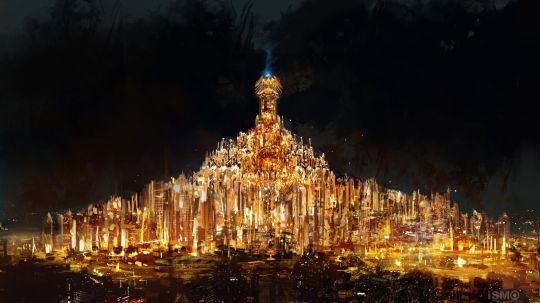
The Hunt: El Dorado, Fabled City of Gold, Remains Hidden in the Amazon
Centuries have seen countless explorers brave hardships to find the fabled city.
An ancient city of gold somewhere in South America is rumored to have been so fabulously opulent that it has become an expression for any place where people can amass great fortunes. But it has been so elusive that it has become synonymous, like the Holy Grail, with a prized object long sought but never found. Countless men have given their lives in the search for its riches as they ran out of supplies and food, were felled by disease, or encountered violent resistance along the way.
The goal of numerous explorers over centuries, from crews with wooden ships and horses to teams with drones and radar, El Dorado is a lost city, reportedly stretching over great distances in the Amazon rainforest and hidden from prying eyes by its remoteness and the warlike peoples in the forest around it. (The region got its name, in fact, from Spanish explorer Francisco Orellana, who compared the fighting women he encountered during his own search with the Amazons of ancient Greece.)

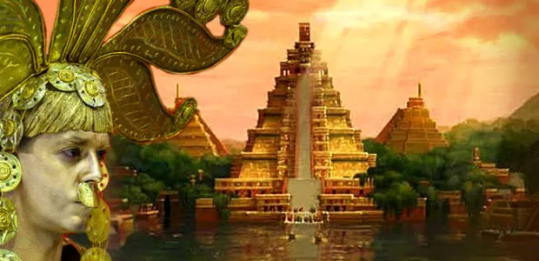
Tales of El Dorado, its name Spanish for “the golden,” began with the Muisca peoples’ perhaps-mythical account of a tribal chief who, in an initiation rite, coated himself in gold. He then went onto Lake Guatavita, near present-day Bogotá, threw a pile of gold objects into the water, and washed the gold off himself as his attendants also threw an abundance of gold objects into the lake. The 16th-century Spanish referred to him as the Golden Man or the Golden King.
“This is the ceremony that became the famous El Dorado, which has taken so many lives and fortunes,” according to a 1638 letter from writer Juan Rodríguez Freyle. That pile of loot was soon fused in the lore with an account of an entire city made of gold. Others posited that the city was called Manoa and was situated on the shores of a legendary Lake Parima, which has also never been found.
Supposedly one of the first to claim he visited it was the Spanish explorer Juan Martinez, who reported that the locals had brought him there blindfolded in 1531 and allowed him to witness it, and that he traveled an entire day through its streets before reaching the emperor’s palace.
When Francisco Pizarro conquered the gold-rich Inca civilization in Peru in 1532, Spaniards believed all the more firmly in the fabled El Dorado. Francisco de Orellana, a relative of Pizarro, unwittingly traveled the entire length of the Amazon, the world’s longest river, in his search for it.
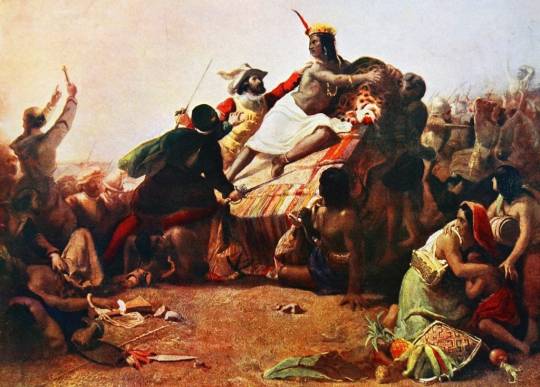
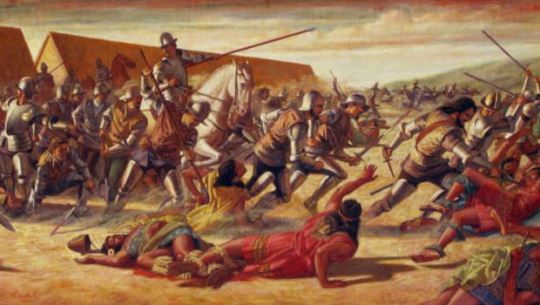
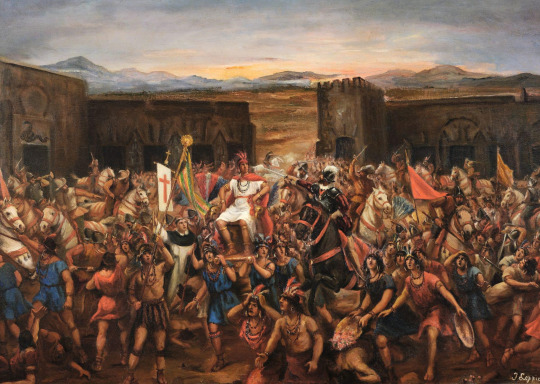
Some gold did turn up in a lake, seeming to justify the continued search. After he found Guatavita, a sacred lake in the Andes, in 1537, conquistador Gonzalo Jiménez de Quesada partly emptied it using a bucket chain. From its depths emerged a few thousand pesos of gold.
Bogotá entrepreneur Antonio de Sepúlveda, for his part, cut an enormous notch in the bank of the lake in 1580, removing a great deal of water before the notch collapsed and killed many of the workers. For his trouble, he uncovered three times as much gold as Quesada had, and sent it to King Philip II of Spain. Alexander von Humboldt, the 19th-century German explorer, would calculate that there could be as much as $300 million in gold in the lake.
English explorer Sir Walter Raleigh went looking for El Dorado in 1594, followed by the Spanish conquistadores, who scoured modern-day Colombia, Venezuela, Guyana and Brazil in the search. Less well-known expeditions continued over the 17th and 18th centuries, bodies piling up but ultimately turning up nothing.
In findings from a major scientific investigation, Von Humboldt would claim, ca. 1800, to have disproven the existence of the lake El Dorado is meant to have flanked. In the following decades, two other researchers came to the same conclusion.
But the legend did not die. The search was revived a century later, when an English company drained the lake almost entirely. Despite their efforts, they extracted artifacts worth only about £500, some of which went to the British Museum, some of which sold at Sotheby’s London. In 1965, the Colombian government designated the lake as off-limits to further attempts.
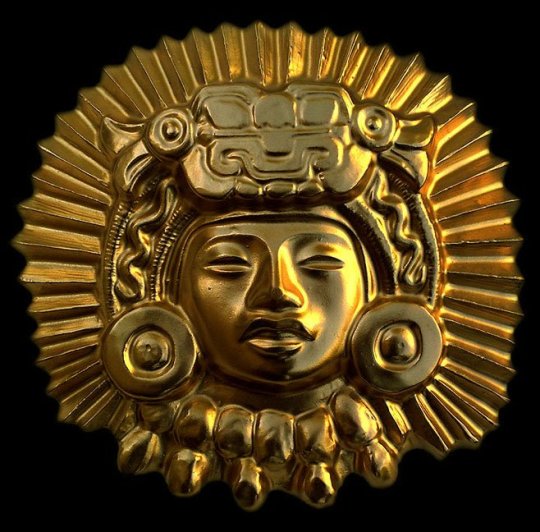
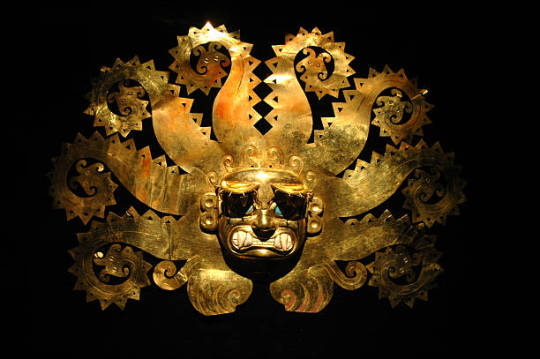
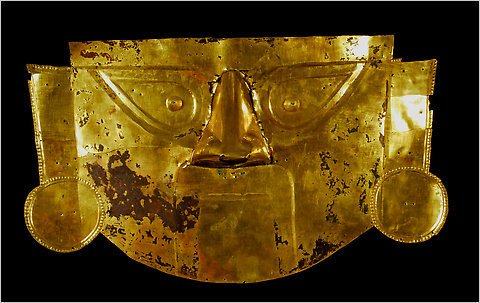
The quest continues with the help of modern technology. A team led by Venezuelan archaeologist-explorer Jose Miguel Perez-Gomez went looking, employing aerial and satellite remote sensing surveys obtained from NASA’s Shuttle Radar Topography Missions (SRTM), the Landsat Enhanced Thematic Mapper Plus (ETM+) instrument, and TanDEM-X synthetic aperture radar (SAR) sensors from the German Aeropsace Center’s Microwave and Radar Institute, according to a 2019 paper. Of all the unlikely results, their findings strongly resembled the outlines of a lake in a map drawn by none other than Sir Walter Raleigh.
The area is not without rich natural resources, so dreams of a city of gold can perhaps be forgiven. Illegal extraction operations are underway to this day, in fact, in what the Venezuelan government in 2016 designated the Orinoco Mining Arc, which covers 12 percent of the country’s territory and is rich not only in gold but also bauxite, coltan, and diamonds, possibly totaling some $2 trillion in value. You can literally see the modern gold mining from space: in 2021, an astronaut passing over eastern Peru in the International Space Station used a Nikon camera to snap a photo that reveals numerous gold prospecting pits.
Over the years, El Dorado has shown up in popular culture countless times, from a 1989 Neil Young record to video games, a board game, and the Cadillac Eldorado. So even as the city has remained stubbornly hidden over centuries, it is, in its way, all around us.
By Brian Boucher.



#The Hunt: El Dorado Fabled City of Gold Remains Hidden in the Amazon#El Dorado#the lost city#lost and found#Francisco Orellana#Juan Martinez#Francisco Pizarro#Gonzalo Jiménez de Quesada#gold#silver#ancient artifacts#archeology#archeolgst#history#history news#ancient history#ancient culture#ancient civilizations#inca empire#long post#long reads
22 notes
·
View notes
Text

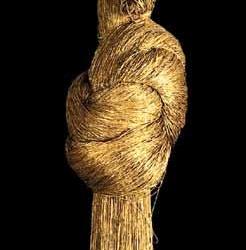
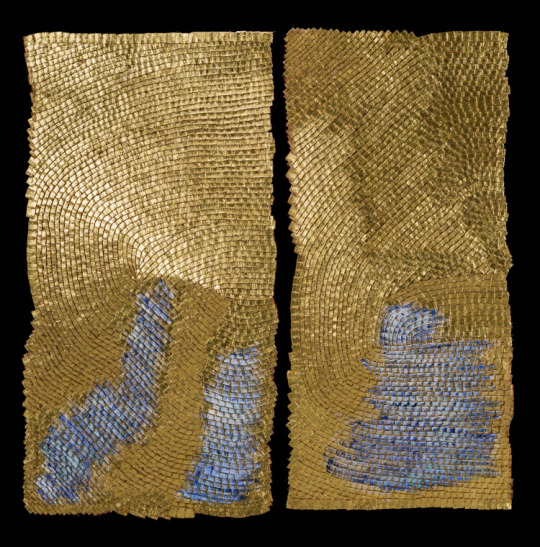
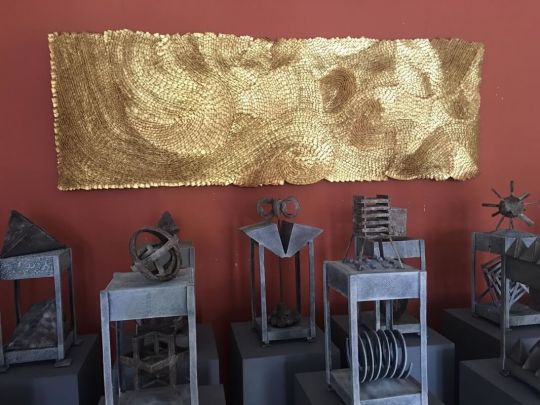
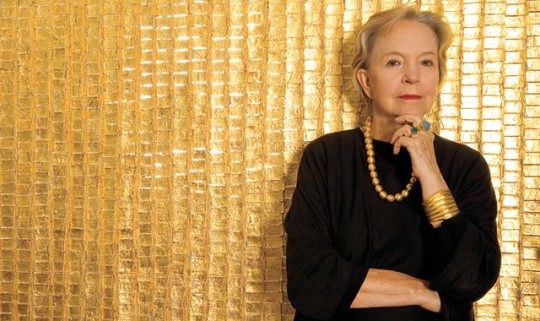
Colombian artist Olga de Amaral (b 1932) first exhibited her “golden surfaces of light” at the André Emmerich’s New York gallery in 1973. Her work plays a unique balancing act between fine art and fiber art. Gold has become a formal part of her vocabulary and renders her work collectively recognizable.
Methodically assembled with a myriad of rectangular pre-fabricated pieces of fiber made into strips and rolls, the artist recreates the inner world of the universe. The compositions are a labyrinth of winding, swirling and twisting interwoven patterns. Wind, light, mountains, trees, and rivers take heroic grandeur in her exploration of the universe.
Departing from the static world of the two-dimensional surface, she conceives monochromatic environments of shimmering presence and seductive forms. She weaves, cuts, molds, marks and tints her materials, fusing and merging them to create a tension that redefines the natural order of things. Their content is only revealed upon close examination, and “just when we think we have it in our grasp, defined and categorized, it slips away, taking on another shape,” describes art historian, Twylene Moyer.
Born in Bogotá, Colombia, Olga de Amaral studied at the Cranbrook Academy of Art. During the 1960s, Amaral played an important role in transforming traditional two-dimensional textiles into sculptural works of art. In 1973 she was awarded the Guggenheim Fellowship, and in 2005 she was selected as a Visionary Artist by the Museum of Art and Design in New York, an award that celebrates her commitment to the highest quality. She is represented in the collections of over 40 museums worldwide including the Museum of Modern Art and the Metropolitan Museum of Art in New York.
20 notes
·
View notes
Text
To the end of the Amazon in Brazil: ‘there are forms of life here that I never knew existed’
On the final leg of his Amazon adventure, our writer arrives in Brazil, where he looks at efforts to revive tribal cultures and to protect wildlife in the world’s most fascinating environmental battleground
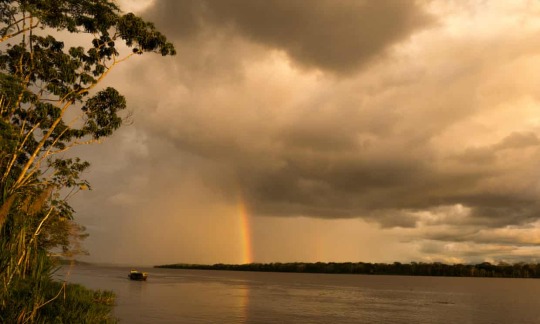
The boatman drops me on a small wooden landing stage next to what I assume is the riverbank. “They’ll be here soon,” he says. “The lodge is up a creek and my boat can’t get there.” When he has gone, I clamber up on the bank and discover that I’m actually on an island. Orioles are perched on swaying stems of tall grass; a hawk and an osprey are watching for fish. Despite the drought-induced low water, the Amazon stretches far away to a distant shore and the smooth surface is occasionally split by a river dolphin rising for air. I have a moment of pure exhilaration. I am alone in the centre of the Amazon basin, unsure if I’m in Peru, Colombia or Brazil, but feeling that I’ve escaped such mundane concerns.
From the shimmering heat downstream a canoe appears, carrying two men. One sits upfront, a battered straw hat pulled down low over a wispy grey beard and round horn-rimmed spectacles. He looks like an intellectual who has spent a lifetime living in the remotest places on Earth. And that, as it turns out, is precisely what he is.
Diego Samper is not your usual Amazonian. As a teenager, he ran away from comfortable city life in Bogotá and spent two years alone on an island in a remote jungle river in Colombia. Exploring by canoe, he later discovered and bought the ruins of a merchant’s clapboard house dating back to the rubber boom of the early 20th century. “We called it Calanoa, spirit of the forest,” he tells me. After 12 years, his idyll ended when gold was discovered in the river outside. “In six months it went from heaven to hell,” he tells me. “Gold prospectors brought drugs and violence.” Then the Farc arrived, one-time leftist guerrillas turned criminal entrepreneurs. Diego and his young family fled. Two years later, they settled next to the Amazon, determined to build Calanoa 2 and tie its existence inseparably to improving the lives of local Indigenous people.
We motor against a strong current up a side creek. “This used to be the riverfront,” Diego says, “but the Amazon threw up a new island, so we’re now on a side creek.” It’s a reminder that Amazonia is naturally an ever-changing world. He points south, across the main river. “Not so far in that direction are tribes who are called ‘uncontacted’, although it’s more likely they are simply retreating from a world they mistrust and dislike.”
Continue reading.
8 notes
·
View notes
Text
Ecuador's Last Laugh in Guayaquil
I’d conked out last night and slept soundly until the first plane flew over the city around 6:30am. I lounged for a bit and finally got myself together for a walk down to the old bridge remains and then along the river to the market. I found the smoothie stall and ordered the stress smoothie and a cheese empanada for my breakfast. They told me to sit down at the communal table out front while I waited and then charged me $8.75 for this. I didn’t have the time to seek out a cheaper option so I paid telling myself “they need it more than me”. The empanada was a huge mound of fried dough covered in sugar, not very cheesy so essentially a big breakfast donut. I asked them to give me the smoothie to go so I could drink it on my way to the cafe for my morning coffee. They poured it into a water bottle for me and it tasted really nice like an orange juice, although not worth whatever tourist price they’d charged for it! I walked to Slow Brew for my flat white and to my surprise the same Western guy who was in the cafe yesterday was also in this place! It was a nice cafe so I could drink my smoothie and coffee in peace before heading back to the hostel to get ready to leave for the airport. I was super lucky once I stepped out into the hotel’s quiet side street in my boot that there was a taxi dropping someone off about 4 doors down. I flagged him down and jumped in, providing the address of the shuttle company across town. I gave him $3 for the $2.20 ride to get rid of my coins and he had me arriving right before the check in time. When the shuttle was ready to board, there were somehow already a bunch of bags and jackets on seats to reserve them. I took one by the window in the front as there was a phone charging on the aisle seat beside it but figured that’s fair game. Fight me while I’m in the boot! The shuttle gradually filled up around me and some people got on complaining that they couldn’t sit together but I thought, in this moment I don’t speak Spanish at all. It was a nice scenic drive through the Cajas National Park with a stop at a small cafe although the fog had rolled in so there was nothing to see at their viewpoint. We carried on down through the fog and cloud forest down to some city views and farmland at this lower elevation. As we approached Guayaquil (most dangerous city in Ecuador at the time of writing) the open spaces and regular shops and houses were replaced with caged buildings. The cage would surround their outdoor seating area, or storefront, with a door or a small window to pass money and goods through. Guayaquil’s traffic was insane, everything bumper to bumper with close calls and no giving way! We eventually arrived to what is the worst airport in the world, probably. There were no chairs at all to sit on and they had an aggressive guy on the line to check in for flights that barked at people to stay back until he allowed them to pass through to check their bags in. Once I finally got to the front of the queue to check in, the lady sent my bag into the hold but then noticed my boot and said I couldn’t be flying while wearing it without a doctor’s note. After about 30 minutes of back and forth with her and the manager they came to the conclusion that I would have to be escorted down to a secure area where my bag would be offloaded, I’d have to retrieve my shoes and then walk onto the plane in shoes instead of the boot. The secure area was two officers checking bags for suspicious items with their owner’s present to unzip/unlock the bags. Luckily my escort was familiar with the situation and explained to the officer who watched me like a hawk while I got my shoe and brace out and then passed the bag back to him. When I was taken back up to the boarding gate the sign was flashing “Boarding Closed” so I raced over and quickly scanned through and took my seat. It was one last rigmarole of Ecuador but I made it to Bogotá ready for more fun Colombian adventures!
3 notes
·
View notes
Text
Triskelion

The Triskelion was build along the Potomac river on Theodore Roosevelt Island, Washington DC and served as the headquarter and operating base for SHIELD, and unknowingly, also Hydra.
I think they could've known.
Lemme explain-
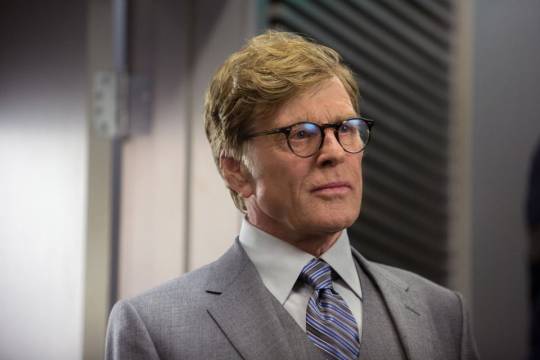
Alexander Pierce was recruited by Hydra after the incident in Bogotá where he met Nick Fury. He became Undersecretary of the World Security Council in about 1980.
The triskelion was built/under heavy construction in 1989 as shown in the Ant-Man movies when Hank Pym left SHIELD.

So it is very very likely, that Alexander Pierce, at the time already in high position at both SHIELD and HYDRA, was involved in building/reconstructing the Triskelion.
Why a Triskelion? You will laugh.
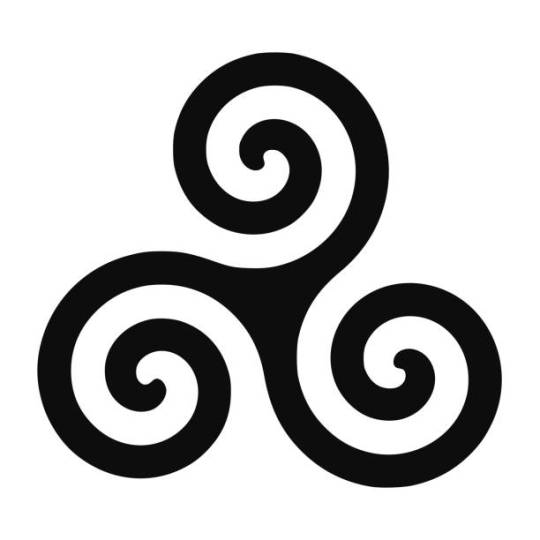
Triskelion/triskele symbols are associated with a bunch of different beliefs and attributes, including celtic and greek culture, several paths of history and christianism, going all the way back in time to the iron and bronze age.
Among others the triskelion held and still holds meaning in Nazi/neo-Nazi culture and beliefs, where the symbol was especially used after WW II, because former symbols (swastika) got banned/were too easily recognized and the use was prosecuted. So instead of them, the Triskelion symbol took their place on flags and as a way to recognize them.
Furthermore the triple spiral of the triskel is used within BDSM culture, symbolizing the three roles of top/bottom/switch and also being utilized as a telltale sign among BDSM members to recognize each other without outsiders knowing, wearing triskelion accessories to spot each other.
So. The triskelion was literally named and shaped like a sky high monument to Nationalism/Nazis and BDSM culture.
Everything about that building screamed HYDRA. Are you fucking kidding me-
(NOTE: This is not me dooming or shaming BDSM culture. A lot of aspects and practices used inbBDSM are implemented in HTP storylines. Healthy BDSM is consentual and not tied to brainwashing.✨)
#im sayin they couldve known#its not that hard#no proof#just heavy indicators#warning signs#in neon lights#also hydra trash party is canon#tell me what you think#marvel#winter soldier#hydra#hydra trash party#mcu
49 notes
·
View notes
Text
Events 7.20 (before 1940)
70 – Siege of Jerusalem: Titus, son of emperor Vespasian, storms the Fortress of Antonia north of the Temple Mount. The Roman army is drawn into street fights with the Zealots. 792 – Kardam of Bulgaria defeats Byzantine Emperor Constantine VI at the Battle of Marcellae. 911 – Rollo lays siege to Chartres. 1189 – Richard I of England officially invested as Duke of Normandy. 1225 – Treaty of San Germano is signed at San Germano between Holy Roman Emperor Frederick II and Pope Gregory IX. A Dominican named Guala is responsible for the negotiations. 1398 – The Battle of Kellistown was fought on this day between the forces of the English led by Roger Mortimer, 4th Earl of March against the O'Byrnes and O'Tooles under the command of Art Óg mac Murchadha Caomhánach, the most powerful Chieftain in Leinster. 1402 – Ottoman-Timurid Wars: Battle of Ankara: Timur, ruler of Timurid Empire, defeats forces of the Ottoman Empire sultan Bayezid I. 1592 – During the first Japanese invasion of Korea, Japanese forces led by Toyotomi Hideyoshi captured Pyongyang, although they were ultimately unable to hold it. 1715 – Seventh Ottoman–Venetian War: The Ottoman Empire captures Nauplia, the capital of the Republic of Venice's "Kingdom of the Morea", thereby opening the way to the swift Ottoman reconquest of the Morea. 1738 – Canadian explorer Pierre Gaultier de Varennes et de La Vérendrye reaches the western shore of Lake Michigan. 1799 – Tekle Giyorgis I begins his first of six reigns as Emperor of Ethiopia. 1807 – Nicéphore Niépce is awarded a patent by Napoleon for the Pyréolophore, the world's first internal combustion engine, after it successfully powered a boat upstream on the river Saône in France. 1810 – Citizens of Bogotá, New Granada declare independence from Spain. 1831 – Seneca and Shawnee people agree to relinquish their land in western Ohio for 60,000 acres west of the Mississippi River. 1848 – The first Women's Rights Convention in Seneca Falls, New York, a two-day event, concludes. 1864 – American Civil War: Battle of Peachtree Creek: Near Atlanta, Georgia, Confederate forces led by General John Bell Hood unsuccessfully attack Union troops under General William T. Sherman. 1866 – Austro-Prussian War: Battle of Lissa: The Austrian Navy, led by Admiral Wilhelm von Tegetthoff, defeats the Italian Navy near the island of Vis in the Adriatic Sea. 1871 – British Columbia joins the Canadian Confederation. 1885 – The Football Association legalizes professionalism in association football under pressure from the British Football Association. 1903 – The Ford Motor Company ships its first automobile. 1906 – In Finland, a new electoral law is ratified, guaranteeing the country the first and equal right to vote in the world. Finnish women are the first in Europe to receive the right to vote. 1917 – World War I: The Corfu Declaration, which leads to the creation of the post-war Kingdom of Yugoslavia, is signed by the Yugoslav Committee and Kingdom of Serbia. 1920 – The Greek Army takes control of Silivri after Greece is awarded the city by the Paris Peace Conference; by 1923 Greece effectively lost control to the Turks. 1922 – The League of Nations awards mandates of Togoland to France and Tanganyika to the United Kingdom. 1932 – In the Preußenschlag, German President Hindenburg places Prussia directly under the rule of the national government. 1935 – Switzerland: A Royal Dutch Airlines plane en route from Milan to Frankfurt crashes into a Swiss mountain, killing thirteen. 1936 – The Montreux Convention is signed in Switzerland, authorizing Turkey to fortify the Dardanelles and Bosphorus but guaranteeing free passage to ships of all nations in peacetime. 1938 – The United States Department of Justice files suit in New York City against the motion picture industry charging violations of the Sherman Antitrust Act in regards to the studio system. The case would eventually result in a break-up of the industry in 1948.
2 notes
·
View notes
Text
Demasiadas mujeres (Javi Peña mini fic)
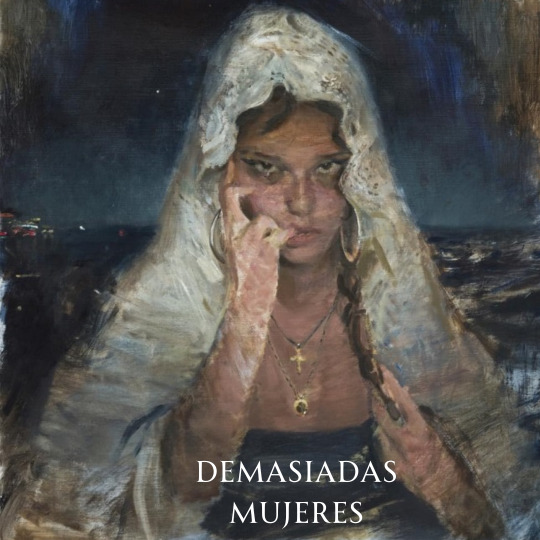
I wrote a little bit today, I'm stuck with "Beg the sea for mercy" and looked for inspo through my phone notes and this came out and I decided to finish it. This is not really a fic, maybe it is a character study more than anything else.
I adore Javier Peña and I think it is a very complex character and I have sooo many thoughts about his relationships with women. Listen I do not think he is a womanizer, I think he adores women and well, this piece maybe is a little weird but that's just fun to get into his head.
Inspiration for this fic is a Spanish rapper song, Demasiadas mujeres (too many women) by C Tangana, art is actually the CD covers from Ivan Floro, you can check out the song here
Warning: talk about prostitution, non-descriptive sex, mummy issues, alcohol, mention of violence, I do not think there's anything else.
He lets the drink down, the yellow liquor sways on the glass, or maybe he drank too much.
The nights at the ranch are quiet, the soft and low hum of the TV, his father breathing heavily but refusing to go to bed. Outside the cattle sleeps, the river and the grass moving to the warm breeze, nothing else for miles, but he feels the end of this town begin to swallow him.
His younger self refused it, fought it and ran away. Now he welcomes it, it’s a warm and tight embrace as that of a mother. The pressure on his back and his chest leaves no space for solitude or loneliness.
Now, many years after, he realized this feeling, this being tucked, feeling calm and at home, somewhere warm and delicate, soft as the sound of the river at night was what he looked out in so many women.
Too many women.
The way their flesh bent to his hands, how they smell in that spot between their jaw and their ears, so soft, so close to their pulse. Feeling it rush, he hoped and made sure it was never out of nervousness but excitement and pleasure.
Being lost in them every night in Colombia made him feel alive. At midnight, he could just be Javi, pick up the phone and call them.
He remembers every one of them, Helena, Gabi, the office girls, so many women. Even the ones he didn’t get a name, not a real one at least.
He remembers their flesh shining, turning, trembling. Their soft voices, whispering, cries that were only his for a tiny space of time. In that bed, he was just a man, naked literally and figuratively, lost inside a woman, naked of clothes and judgement. They knew how it went, how it ended.
Javi thinks about the first. That first time he stepped foot at Calle Naranjos número 4. That beautiful house in Bogotá.
“Best girls in town” somebody had told him, “Too expensive for you, Peña”
He didn’t go asking for sex, he told himself, he just had seen so many terrible men coming and going with girls that work this life and went with a hunch. At first, they didn’t talk, he understood rather easily that a man that comes to a brothel asking for anything than the usual will be looked as weird and not as friendly.
Javi presented a few bills, he thought enough, and the madame smirked and called a girl from the living room where all of them were waiting in various lacy and silks outfits. A young girl stood up, and he regretted instantly coming here. She was scared, grabbed his hand on hers, sweating, trembling.
He remembers her coming in the room. The sun entering through the blue curtains leaving the room in a twilight hue, her trying to undress, him stopping her. In that tiny space where there were just a bed, and a vanity and condoms on a bowl.
A tiny black and white picture on its side, almost hiding behind it. A child seated on the lap of a lady that looked at her lovingly.
He asked for her name, and she told him something fake, he doesn’t remember now. He never touched her once that day, or the next, and the next after that.
Somehow, the sex that was so expected in those meetings was never there at first. But it got mixed as everything else. His personal life, his will and morals deluded in whiskey and too many cigarettes watching the decay and impunity of the men he was after, one after the other escaping between his fingers like sand.
She sat watching him pour another glass, light another smoke and show the pictures once again on one of those dates, they regularly had.
“Nos lo he visto, Javi” (I haven’t seen them, Javi)
Frustrated, he put pressure on his temples, other men would scream, slam the whiskey tumbler to the wall. Violence, he was tired of it. He needed softness, being embraced, velvet and warmth.
As he stopped her from undressing months back, she stopped his self-torture that night and put her much gentler hands on his face and massage his frown, flattening his wrinkled muscles, the soft pressure, her kindness and her fresh perfume.
He promised he would not touch her, but it was her that initiated, he collapsed on her lap, put his head on her belly as he did when he was a child, running, scared to the safest place he has ever known.
“Javi” for a moment he thought it was her. The girl grabbed his face on her palms.
“No te vayas” (Don’t go)
He begged and felt her pulling back delicately. The hour was gone. His hands wandered to her hips and the plush skin there over her dress. He put again his frown on her belly, and his hands got low to the back of her legs.
He used to stop her like that, many years ago.
Me tiene que ver el médico, Javi. Yo ya vengo. (I have to go to the doctor, Javi. I’ll be right back)
He remembers his hands reached just to the back of her knees and his face pressed between her. Maybe if he stopped her legs from moving, she could not go see the doctor, maybe what he was about to say would not arrive, maybe…maybe death couldn’t reach her from here, from the porch of his house, many years ago. Maybe time would have been kinder to his mum, and he wouldn’t be here, far away, trying to catch evil man that benefit from a corrupt system and begging a prostitute to stay with him because loneliness was torturing him.
But those legs, in that flat in Bogotá, stood beside him, for once, a bit longer. She let him breathe her, touch the back of her legs and her hips. She kissed his face first, his eyes, his forehead before his lips. She sat on him, slowly opening his jeans.
The girl rolled her hips, opened herself and let him in, all of him, this tired, desperate and broken man, the one nobody saw. And he was made a new, Javi let go of everything and hide himself on the delicate skin of her neck and let her ride him, peeled him open like a fruit and take what she wanted. He sucked her pulse and her perfume there, helped her when her breath became unsteady, climbing higher and higher, touching her breasts and between her legs.
That night, she refused the payment of the extra time and refused to stay the night, gently kissed his cheeks and got inside the taxi.
She, and the many other women that came after, were able to read him. Watched him intently while he crumbled before them, just Javi. Javi always running, Javi in the nights he was so close to die, Jav, what are you getting yourself into? All the shades he didn’t see of himself were so clear to them.
Sometimes they love him sweetly, sometimes they let him push his anger away.
And their bodies intertwined in his mind now, so many nights and so many women that contrasted so much to the hours he spent in the base, on the streets on meetings trying to act brave, unbothered, stern and cold.
He knew he was an easy joke to their colleagues, if they knew those women saved him. If they knew that it was always a façade. A secret kept between their eyes and him, the many he shared.
And watching the river turn silver under the moonlight many years after in Laredo, he thinks about them and hope this cruel world was gentle to them at the end, and the peace he found in them was finally fairly compensated.
#javier peña#javier peña fanfic#pedro pascal characters fanfiction#narcos fanfiction#Pedro Pascal#Mini fic
8 notes
·
View notes
Text
Agustín had always been clumsy. Tripping over his own feet, falling into rivers, roofs caving in - it had all happened to him before.
When he visited from Bogotá, he prayed that, just for a bit, he'd be sure-footed, graceful. Anything to impress - never mind impress, have a half-decent conversation with - the woman who sold arepas in the town square.
Of course, he fell flat on his face right in front of her stand. She didn't laugh. She asked him, worriedly, if he was all right, practically shoving an arepa into his mouth. He met her eyes, and couldn't look away.
2 notes
·
View notes
Text
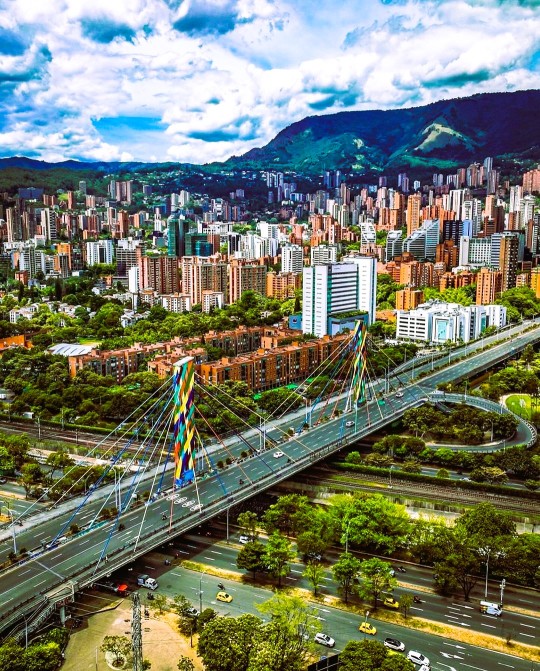
Puente De La 4 Sur, Medellín, Colombia: With 560 meters in length; the 4 Sur Bridge crosses the Medellín River and connects with 4 of the city's most important thoroughfares. The 4 Sur Bridge is the longest intra-urban structure in Colombia...Medellín is the second-largest city in Colombia after Bogotá, and the capital of the department of Antioquia. Wikipedia
118 notes
·
View notes
Text
¡Dua Lipa regresa a Argentina!
La creadora de muchos de los hits más emblemáticos de la última década confirma su regreso al país en el marco de la gira mundial “Radical Optimism Tour”. Presentando su aclamado tercer disco de estudio Radical Optimism, Dua Lipa traerá un show con todo el material nuevo para sumergir al público en su giro hacia un pop más psicodélico, pero fiel a su gusto por la cultura dance y, ¡claro! revisitar todos sus grandes éxitos.
La etapa latinoamericana del tour incluirá siete paradas más en estadios con presentaciones en Chile, Brasil, Perú, Colombia y México.

Terminó la especulación sobre el esperado regreso de Dua Lipa que venía creciendo desde el lanzamiento en mayo de este año de su tercer disco de estudio, Radical Optimism . Los cientos de miles de fans que tiene por estas latitudes ya pueden anotar la fecha: la diva del pop dará un show en el River Plate el martes 7 de noviembre de 2025, nuevamente con producción de DF Entertainment y Live Nation.
Las entradas para esta esperada cita podrán adquirirse a partir del 8 de abril a las 10:00 horas, en preventa exclusiva para todos los clientes VISA SANTANDER, que durará 48 horas. La venta general con todos los medios de pago comenzará el 10 de abril a las 10:00 horas, y en todas las instancias los tickets pueden adquirirse únicamente a través de All Access.
Sucesor de Future Nostalgia (2020), disco con el que Dua Lipa terminó de catapultarse a lo más alto del estrellato escala mundial –fue el disco más escuchado del año y rompió numerosos récords–, Radical Optimism marca un giro en el sonido de la artista angoalbanesa. Colaborando con Kevin Parker de Tame Impala en la producción, Dua Lipa nos regala joyas de pop psicodélico que se mantienen fieles a su devoción por la cultura dance. “The End of An Era” es la canción que abre el disco y que podría traducirse como “El fin de una era”. ¿Qué mejor guiño para que demos vuelta la página y nos sumerjamos con ella en nuevas influencias?
En la tapa del álbum, se la ve a Dua en el agua al lado de una aleta de tiburón: esta imagen sintetiza la idea núcleo del disco, un optimismo radical para nadar en las aguas turbulentas de una relación que termina. Especialista en canciones para empoderarse en las rupturas –pensemos en el hit colosal “Don’t Start Now”–, la cantante vuelve a dar en la tecla con canciones de un pop irresistible como “Houdini” e “Illusion”.
A casi dos años de sus shows en Argentina en 2022, la noticia de la tercera visita –la primera fue en 2017– la encuentra en pleno dominio de su talento en todos los niveles. Dua Lipa ha logrado otro disco impecable, con una producción de altísimo nivel, y viene dando una serie de shows en el Radical Optism Tour con un anclaje muy marcado en el baile, junto a un grupo de bailarines que invitan a que todo el público se sume a la fiesta.
El tour comenzó en junio en Europa, continuará en octubre en Estados Unidos y –luego de un show en el mítico Royal Albert Hall de Londres el 17 de octubre– la verá por escenarios de Asia antes de regresar a Inglaterra para otro venue histórico: el estadio Wembley. Al fin se conoce la parada argentina en el marco de la etapa latinoamericana de la gira, una ocasión imperdible para quienes sean testigos del pop en una de sus formas más espectaculares.
La etapa latinoamericana de la gira Radical Optimism Tour 2025 comenzará en Buenos Aires y la encontrará recorriendo el sur del continente con shows imperdibles para todos sus fans de estas latitudes.
FECHAS LATINOAMERICANAS DEL RADICAL OPTIMISM TOUR 2025:
Viernes, 7 de noviembre - Buenos Aires, Argentina - Estadio River Plate Martes, 11 de noviembre - Santiago, Chile - Estadio Nacional Sábado, 15 de noviembre - São Paulo, Brasil - MorumBIS Sábado, 22 de noviembre - Río de Janeiro, Brasil - Estadio Nilton Santos Martes, 25 de noviembre - Lima, Perú - Estadio San Marcos Viernes, 28 de noviembre - Bogotá, Colombia - Estadio El Campín Lunes, 1 de diciembre - Ciudad de México, México - Estadio GNP Seguros Martes, 2 de diciembre - Ciudad de México, México - Estadio GNP Seguros
0 notes
Text
Photographic Inspiration from Around the World: Learning from Different Cultures
Photography is more than just capturing images; it is a way of preserving history, tradition, and human connection. Travel photographers have the unique opportunity to learn from different cultures, documenting the diverse ways of life across continents. In TRAVEL PHOTOGRAPHY, Dr. Maddur Badarinath emphasizes the importance of cultural sensitivity and understanding when photographing people, festivals, and traditions. Every culture tells a different story, and through the lens, we can appreciate the richness of global heritage.

The Harmony of Tradition and Modernity
Asia offers an incredible mix of ancient traditions and contemporary lifestyles. Countries like India, Japan, and Thailand provide endless inspiration for photographers who want to capture spirituality, architecture, and everyday life. In Varanasi, India, the ghats along the Ganges River come alive with morning rituals and candlelit evening prayers. Meanwhile, Japan’s cherry blossom season transforms cities into dreamy pink landscapes. Dr. Maddur Badarinath shares in TRAVEL PHOTOGRAPHY that learning to adapt to different lighting conditions and cultural nuances is essential when photographing Asia’s dynamic environments.
The Essence of Storytelling Through Portraits
Africa’s rich cultures and vibrant traditions make it one of the most fascinating places for portrait photography. From the Maasai warriors of Kenya to the Himba people of Namibia, every face tells a unique story. The warm, golden sunlight of the African plains enhances skin tones, creating striking images that convey emotion and depth. Dr. Maddur Badarinath advises in TRAVEL PHOTOGRAPHY that photographers should build trust and engage with locals before taking their portraits. Respect and connection are key to capturing authentic expressions.
The Beauty of Historical and Cultural Landmarks
Europe is a paradise for photographers who love history and architecture. From the romantic canals of Venice to the fairytale castles of Germany, every city has its own unique charm. In Paris, the Eiffel Tower at sunrise offers a soft, dreamy glow, while in Spain, the colorful streets of Barcelona provide a lively backdrop for street photography. One of the lessons from TRAVEL PHOTOGRAPHY by Dr. Maddur Badarinath is that patience and timing are essential when photographing popular landmarks—waiting for the perfect light or an interesting subject can make all the difference.
Capturing the Spirit of Urban and Natural Landscapes
North America is a land of contrasts, where towering skyscrapers meet vast wilderness. New York City’s bustling streets offer endless opportunities for urban photography, while the serene landscapes of the Grand Canyon provide a breathtaking escape into nature. Photographers can learn from the way light interacts with both modern and natural settings. Dr. Maddur Badarinath explains in TRAVEL PHOTOGRAPHY that experimenting with different angles, reflections, and perspectives can add a fresh take to commonly photographed locations.
Vibrant Colors and Festive Energy
South America is known for its passion, energy, and vibrant colors. From the bright murals of Bogotá to the lively rhythms of the Rio Carnival, the continent offers dynamic photography opportunities. Machu Picchu’s mist-covered ruins in Peru provide a mystical atmosphere, while Patagonia’s glaciers showcase nature’s raw power. To capture the essence of South America, photographers should embrace movement, light, and spontaneity. As Dr. Maddur Badarinath notes in TRAVEL PHOTOGRAPHY, cultural photography is about feeling the moment and immersing oneself in the local atmosphere.
Every continent, country, and community has something valuable to teach photographers. By exploring different cultures, photographers gain not only technical skills but also a deeper appreciation for humanity’s diversity. In TRAVEL PHOTOGRAPHY, Dr. Maddur Badarinath encourages aspiring photographers to step out of their comfort zones, interact with locals, and capture images that tell meaningful stories. The world is an endless source of inspiration—one just needs a camera and an open heart to explore it.
0 notes
Text
Voice of America 0416 24 Nov 2024
9775Khz 0357 24 NOV 2024 - VOICE OF AMERICA (UNITED STATES OF AMERICA) in ENGLISH from MOPENG HILL. SINPO = 55434. English, music abruptly ends @0359z to dead air until 0400z when VoA News Jingle plays fb News anchored by Alexis Strope. § United Nations climate talks adopted a deal to inject at least $300 billion annually in humanity’s fight against climate change, aimed at helping poor nations cope with the ravages of global warming in tense negotiations in the city where industry first tapped oil. The $300 billion will go to developing countries who need the cash to wean themselves off the coal, oil and gas that causes the globe to overheat, adapt to future warming, and pay for the damage caused by climate change’s extreme weather. It’s not near the full amount of $1.3 trillion that developing countries were asking for, but it’s three times a deal of $100 billion a year from 2009 that is expiring. It was not quite the agreement by consensus that these meetings usually operate with and developing nations were livid about being ignored. § Russian drone and missile attacks have damaged 321 Ukrainian port infrastructure facilities since July last year, President Volodymyr Zelenskiy said on Saturday. Twenty merchant ships belonging to other countries were also damaged by Russian strikes, he added. "Overall, Ukrainian food exports provide food for 400 million people in 100 countries around the world," Zelenskiy said. "Food prices in Egypt, Libya, Nigeria, and other countries in Africa directly depend on whether farmers and agricultural companies in Ukraine can operate normally." Moscow has repeatedly denied that it attacks civilian targets. § Nine more Palestinians were killed and several others injured in Israeli airstrikes on the Gaza Strip, as the humanitarian crisis there grows. § U.S. Secretary of State Anthony Blinken will travel to Italy over the weekend to attend a meeting of the Group of Seven major democracies next week, the State Department said on Friday, amid rising tensions in the war in Ukraine. G7 leaders last Saturday reiterated a pledge to keep imposing severe costs on Russia for its invasion of Ukraine through sanctions, export controls and other measures, and vowed to support Kyiv for as long as it takes. The State Department said Blinken would discuss issues including "conflicts in the Middle East, Russia’s war against Ukraine, Indo-Pacific security, and the ongoing crises in both Haiti and Sudan" at the gathering in Italy. § Heavy downpours fell over much of Northern California on Friday, causing small landslides and flooding a river and some streets, including in parts of San Francisco. Meanwhile, tens of thousands of people were still without power in the Seattle area after several days in the dark. The storm arrived in the Pacific Northwest earlier this week, killing two people and knocking out power to hundreds of thousands, mostly in the Seattle area, before moving through Northern California, where several roads were closed because of flooding and strong winds toppled trees. § Thousands of Colombians took to the streets on Saturday to oppose the policies of President Gustavo Petro, who accused demonstrators of trying to destabilize the government. Protesters in cities including Bogotá, Medellín and Cali decried a series of proposed health, labor and pensions reforms and accused Petro’s administration of corruption. @0505z "International Edition" begins. (shortly thereafter sunrise transmitter site causes signal to significantly weaken and noise level rise). 100' (30m) of Kev-Flex wire feeding "Magic Wand" antenna hanging in backyard tree w/MFJ-1020C active antenna (used as a preamplifier/preselector), JRC NRD-535D, 100kW, beamAz 350°, bearing 84°. Received at Plymouth, MN, United States, 14087KM from transmitter at Mopeng Hill. Local time: 2157.
0 notes
Text
An Alarming Glimpse Into a Future of Historic Droughts
Record dry conditions in South America have led to wildfires, power cuts and water rationing. The world’s largest river system, the Amazon, which sustains some 30 million people across eight countries, is drying up.

Electricity cuts across an entire nation. A capital rationing water. A mayor encouraging people to shower together to save precious drops. The world’s largest river system, the Amazon, which sustains some 30 million people across eight countries, is drying up.
A record-breaking drought that is well into its second year is punishing much of South America, including the Amazon rainforest, upending lives and local economies and providing an alarming glimpse into the future as the effects of climate change become more apparent.
In Brazil, wildfires fueled by searing heat and prolonged dry conditions have consumed vast swaths of forest, wetlands and pastures, with smoke spreading to 80 percent of the country. It has led to canceled classes, hospitalizations and a black dust coating the inside of homes.
To the south, in Paraguay, the Paraguay River has hit new lows. Ships are stranded and fishermen say their most valuable quarry — including the enormous surubí catfish — have all but disappeared, forcing many people to look for work elsewhere to feed their families.
With much of South America dependent on hydropower, electricity production has plunged. In Ecuador, people are enduring energy cuts of up to 14 hours per day, knocking out the internet and sapping the country’s economy.
In Colombia’s capital, Bogotá, the government is cutting water to residential homes at regular intervals and the mayor has suggested that people “bathe as a couple” to reduce consumption.
Long sections of the Amazon River have turned into dry, brown beaches, and officials are dredging sections to make them deeper.
Continue reading.
#Brazil#Bolivia#Colombia#Ecuador#Peru#Venezuela#environmentalism#climate change#environmental justice#brazilian politics#politics#bolivian politics#colombian politics#ecuatorian politics#peruvian politics#venezuelan politics#image description in alt#mod nise da silveira
1 note
·
View note